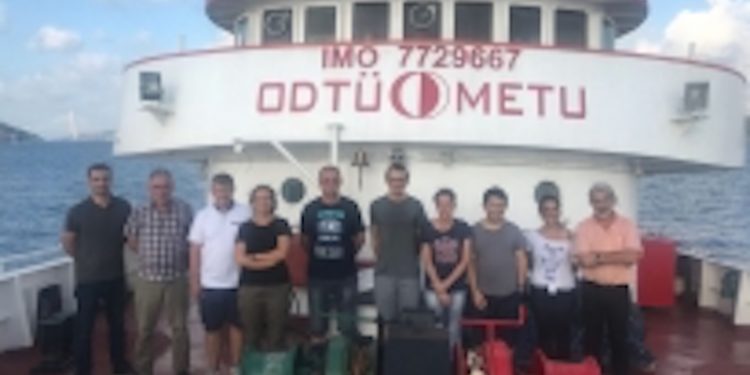A group of Black Sea experts and scientists have concluded today a 21-day survey aimed at assessing the status of Black Sea anchovy and evaluating environmental conditions during its spawning season.
Teams from nations bordering the Black Sea were hosted on board a Turkish research vessel carry out a survey aimed at collecting hydro-acoustic and ichthyoplankton data in the Black Sea.
Under the lead of a team of Turkish scientists, six experts from Georgia, Bulgaria, the Russian Federation and Ukraine sailed on research vessel Bilim-2 for this first-of-the kind initiative in the area representing a concrete opportunity for scientists from different Black Sea coastal states to closely follow, train and share experience on surveys-at-sea.
The initiative was launched by the General Fisheries Commission for the Mediterranean (GFCM) in collaboration with the Middle East Technical University Institute of Marine Sciences (IMS-METU) in Mersin and with the support of the Ministry of Agriculture and Forestry of the Republic of Turkey.
This is part of the regional BlackSea4Fish co-operation project recently established by the GFCM in collaboration with all Black Sea countries and with the financial support of Directorate General for Maritime Affairs and Fisheries (DG MARE) of the European Commission. This project seeks to level the playing field and involve all coastal states in finding solutions to address the main issues at stake for fisheries in the region and to ensure the sustainable management of resources.
Bilim-2 completed a first phase covering the western part of the Black Sea, ending in Sinop. The second phase of the survey covered the entire Turkish EEZ and ended in Trabzon. In addition to practical work, experts had the opportunity to hold short seminars providing scientific insights on hydro-acoustic surveys, data processing and analysis.
The preliminary findings of the survey already provide a wealth of useful information on various aspects. They show in particular a noticeable increase in sea temperature compared to previous years as well as a remarkable decrease in the biomass of sprat and an increase in the quantity of horse mackerel in the southern half of the Black Sea.
In addition, the abundance and biomass of Mnemiopsis leidyi, an invasive jellyfish seen as an important ecological issue in the Black Sea, seems to have decreased. Interestingly, a considerable amount of Atlantic bonito and bluefish juveniles, which have never been encountered in the Turkish EEZ in July, were sampled for the first time.
The final results of the survey will be presented to the GFCM and will be crucial in shedding further light on possible factors, including climate change and pollution, that influence the movements and variations of fish stocks, in particular Black Sea anchovy, one of the most emblematic and consumed species in the Black Sea.
‘Surveys and research are extremely important to support stock assessment work and improve the quality of scientific advice. Quality advice is essential to establish joint management plans and achieve sustainable fisheries,’ said Ali Cemal Gücü, Professor at the Institute of Marine Sciences of the Middle East Technical University in Mersin and Co-ordinator of the BlackSea4Fish project.
Scientific research on the distribution and abundance of key stocks and on environmental conditions is in fact essential to understand stock dynamics in the Black Sea. In this peculiar marine basin, characterised by a low salinity surface layer and a significant anoxic layer below 200 metres where no commercial marine species reside, water temperatures, currents and food availability create regional differences that force fish stocks to migrate large distances in ways that are not easily predictable.
‘This collaborative work during a survey-at-sea is a virtuous example of cooperation among countries and we are grateful to the Turkish Ministry of Agriculture and Forestry and the Middle East Technical University for their precious collaboration. Initiatives like this one are vital to enhance scientific exchange and data collection,’ said GFCM Executive Secretary Abdellah Srour.
‘In a region where natural resources spread across different countries and territories, coordinated strategies are crucial. Only cooperative and concerted efforts can lead to a rational use and management of marine living resources,’ he added.
The possibility to extend the next Turkish survey on Black Sea anchovy this autumn to cover Georgian waters, in collaboration with the Turkish and Georgian administrations, is currently being explored and would represent an important step forward to increase the coverage of anchovy surveys in the Black Sea.









